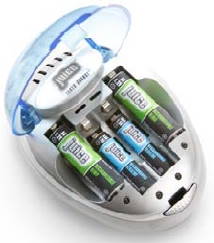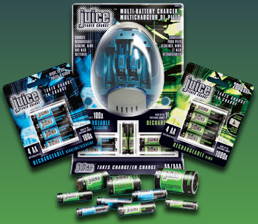 Christmas
is around the corner and it is time to start on our Christmas
Gadget-Guru Wish List. This year, our first addition is the Juice
Multi-Charger introduced at the Consumer Electronics Show in Las Vegas
last year.
Christmas
is around the corner and it is time to start on our Christmas
Gadget-Guru Wish List. This year, our first addition is the Juice
Multi-Charger introduced at the Consumer Electronics Show in Las Vegas
last year.
Until they figure out how to absorb the ambient energy in the room directly into our gadget belts, the need for batteries will remain an unfortunate part of our reality. And while the path to quality rechargeable batteries has been a long and bumpy road, at least one company seems to be on the verge of smoothing out the ride.
In my office at home, I have four very-heavy drawers labeled "C&D Batteries," AA & AAA Batteries," "Special-Purpose Batteries," and "Rechargeable Batteries." Inside the Rechargeable Battery drawer is a hodge-podge of NiCD, Alkaline, and NiMH batteries that I have gathered over the years, and they come in all flavors and sizes. But, with the help of some blue and green juice, my New Year's resolution will be to free up some office space by scaling back to just one battery drawer. And instead of a horde-ish supply of disposable batteries, I should be able to get by with just a few, because when I pull four batteries out of the drawer, I should be putting four back in from the device (after they are recharged, of course).
 If
there is a kink in my plan, I can only find one, and it has to do with
the nature of NiMH (Nickel Metal Hydride) batteries. These batteries
(the green juice) are designed for high-drain devices like digital
cameras with flash, and can be recharged more than 1000 times.
However, while the shelf-life for a rechargeable Alkaline battery is
seven years, the NiMH batteries can only hold their charge for about a
month, meaning that I am going to have to come up with a system for
refreshing these batteries. With the juice charger, this may not be a
serious problem, because the batteries in the microprocessor-based
charger are automatically refreshed, meaning that everything will be
fine as long as I pull my new batteries directly from the charger.
If
there is a kink in my plan, I can only find one, and it has to do with
the nature of NiMH (Nickel Metal Hydride) batteries. These batteries
(the green juice) are designed for high-drain devices like digital
cameras with flash, and can be recharged more than 1000 times.
However, while the shelf-life for a rechargeable Alkaline battery is
seven years, the NiMH batteries can only hold their charge for about a
month, meaning that I am going to have to come up with a system for
refreshing these batteries. With the juice charger, this may not be a
serious problem, because the batteries in the microprocessor-based
charger are automatically refreshed, meaning that everything will be
fine as long as I pull my new batteries directly from the charger.
So, to make the transition to 100% rechargeables, I am going to need to figure out what portion of my needs are low-drain versus high-drain, because I definitely prefer the lower cost and longer shelf-life of the blue juice (alkaline). Then, I need to go through my hodge-podge of rechargeable batteries and color-code them (Energizer also uses green for NiMH, but they reserve blue for Lithium, and all my X1 NiMH rechargeables are blue and should be green).
Are there other drawbacks to this single-charger solution? Yes, there are a couple. The first is that this charger will not charge C and D batteries, although Juice has a separate larger charger for these. The second is that the juice charger's top is spring loaded, and a bit touchy, meaning that it pops open with almost any movement. Also, while the the charger compartment loaded with four batteries weighs only eight ounces, the transformer needed to provide juice for the Juice is almost two pounds of dead weight. With the weight and the top opening so easily, I don't think I'll be throwing this charger in my carry-on bag.
Need another reason to commit to rechargeables? How about doing it for the sake of the environment? Over the life of a NiMH battery (the green juice), you can spare mother nature from having to deal with 1000 dead batteries, and save some money to boot.
So, can we just go with rechargeables and never buy another disposable? Unfortunately, until someone comes up with a nice solar-powered fast-charger, I will still need disposables for my emergency battery supply, in the event of a long-term catastrophic power failure. For that reason, after the new year (assuming Santa grants everything on my Christmas wish list), I will be packing my remaining disposable batteries in our emergency supply kit, in a dark cold place, and make sure I replace them every few years.
The Juice Multi-Charger with eight batteries sells for under $30 at major retail outlets. Juice is produced by Winner International, the same company that introduced us to the automotive anti-theft device, "The Club."
For more information on this product visit www.juicebatteries.com.

 Gadget Gurus technology reviews are heard and read by millions of people across the United States, including more than a dozen
Gadget Gurus technology reviews are heard and read by millions of people across the United States, including more than a dozen 